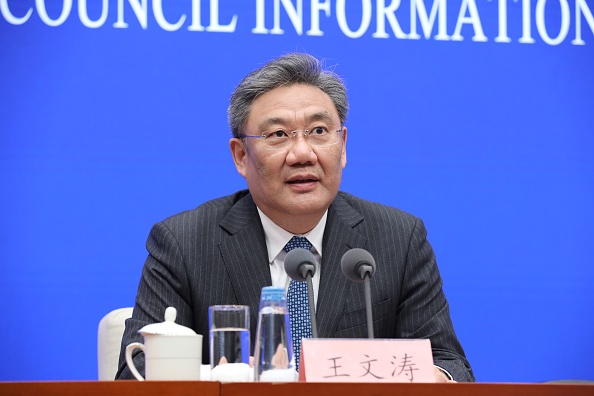
 Provocative Actions
Provocative ActionsWhile recent high-level meetings between officials from the U.S. and China have signaled a potential warming of bilateral relations, ongoing frosty military and security relations show little signs of thawing. Most recently, after a Chinese plane crossed in front of an American surveillance aircraft over the South China Sea, China allegedly denied an invitation for the Minister of National Defence Li Shangfu to meet with U.S. Defense Secretary Lloyd Austin on the sidelines of the Shangri-La defense summit in Singapore.
"The [People's Republic of China] informed the U.S. that they have declined our early May invitation for Secretary Austin to meet with PRC Minister of National Defense Li Shangfu in Singapore this week," Pentagon press secretary Brig. Gen. Patrick Ryder said in a statement.
U.S. Defense Secretary Lloyd Austin said it was "unfortunate," and would welcome any opportunity to engage with Li in the future.
Beijing, however, blamed the U.S. for the aircraft provocation and refuted the notion that it had rejected the meeting with Austin. Instead, it said the U.S. must "correct its mistaken actions" to resume military dialogue.
"Washington should earnestly respect the sovereignty, security and interests of China and immediately correct its mistaken actions to show its sincerity [to talk]," said spokesperson Mao Ning. "Such provocative and dangerous actions are the root cause of maritime security issues, and the U.S. should immediately stop such dangerous provocative actions."
Learn more in "Common Ground," an interview with Ted Carpenter, a a Senior Fellow with the Randolph Bourne Institute.
 A Convergence of Allies
A Convergence of AlliesIn a sign that the U.S. and Europe are aligning on policies to push back on China, the two powers jointly pledged to work together to counter China's economic practices and alleged disinformation, particularly related to Russia's invasion of Ukraine.
In a joint statement at the end of the EU-U.S. Trade and Tech Council meeting, the two parties said that they were ready to address what they believe are China's non-market practices and that they were deeply concerned about foreign information manipulation, interference, and a proliferation of false information.
Secretary Blinken claimed that there has never been a time of greater alignment between the United States and Europe—as well as with key partners in Asia—on the approach to China.
The convergence is symbolic of an improvement in the EU-U.S. relationship that suffered during the presidency of Donald Trump. Washington is eager for the EU to take a more aggressive stance toward Beijing, encouraging them to target China as a geopolitical and economic threat. However, there are signs that the EU has not yet adopted a unified stance, highlighted by, Macron's recent state visit. China also has embarked on renewed diplomatic outreach, to advocate for a different approach to EU-Sino relations.
Despite these efforts, the European Union has proposed blacklisting several Chinese companies and restricting exports to at least seven Chinese companies accused of circumventing existing EU sanctions by selling dual-use items they imported from Europe to Russia.
China's ambassador to the European Union, however, warned of retaliation if the EU were to target Chinese companies in new Russia sanctions, saying that it is "unfair" and "not sensible" for European lawmakers to link the war in Ukraine with China-EU relations.
A Chinese Commerce Ministry spokesperson said "China firmly opposes unilateral sanctions that have no basis in international law and are not authorized by the Security Council as well as long-arm jurisdiction," calling on the EU to "act prudently and to not set a bad precedent."
Read more in "The Yin and Yang of the China - EU Geopolitical Relationship," by Sebastian Contin Trillo-Figueroa, an EU consultant and AsiaGlobal Fellow at Asia Global Institute, HKU.
 Business Diplomacy
Business DiplomacyU.S. Secretary of Commerce Gina Raimondo recently met with her Chinese counterpart Wang Wentao in Washington, in the first U.S.-China cabinet-level exchange in months. The two discussed various economic and trade concerns, including intellectual property rights, market access, tariffs, and the trade imbalance.
They had "candid and substantive discussions on issues relating to the U.S.-China commercial relationship, including the overall environment in both countries for trade and investment and areas for potential cooperation," the U.S. Commerce Department said.
The Commerce Department also added that "Secretary Raimondo raised concerns about the recent spate of PRC actions taken against U.S. companies operating in the PRC."
The meeting came as a rising number of foreign entrepreneurs have shown interest in relocating their businesses outside of China due to increasing tensions with the U.S. and supply chain concerns. Trade restrictions and political uncertainties have also contributed to their motivation for seeking opportunities abroad, which analysts have noted could have implications for China's tech industry and the broader economic landscape.
Meanwhile, Elon Musk just returned from a visit to China, his first since before the pandemic, where he aimed to signify the importance of maintaining positive trade relations and business diplomacy. Musk met with Chinese Foreign Minister Qin Gang, who reassured him that China remains open for business and expressed support for Tesla's operations in the country. Qin also emphasized the importance of mutually beneficial cooperation and highlighted China's commitment to creating a favorable business environment for foreign companies.
Despite the complexities of the U.S.-China economic relationship and the role of business in shaping bilateral ties and geopolitical dynamics, "both sides have agreed to establish communication channels to maintain and strengthen exchanges on specific economic and trade concerns and cooperation matters," stated the Chinese Ministry of Commerce.
Prepared by China-US Focus editorial teams in Hong Kong and New York, this weekly newsletter offers you snap shots of latest trends and developments emerging from China every week, while adding a dose of historical perspective.
- 2023-05-26 New Diplomat in Town
- 2023-05-19 More than Words
- 2023-05-12 Meeting Halfway
- 2023-05-05 Golden Week
- 2023-04-28 Diplomatic Dance
- 2023-04-21 Constructive and Fair
- 2023-04-14 Shoulder-to-Shoulder
- 2023-04-07 Push and Pull
- 2023-03-31 Tsai in Transit
- 2023-03-24 A Changing World
- 2023-03-17 Peacemaker Xi
- 2023-03-10 Party Time
- 2023-03-03 “An Existential Struggle”
- 2023-02-24 Opposing Worldviews
- 2023-02-17 Ripple Effects
- 2023-02-10 Ballooning Tensions
- 2023-02-03 Hot Air
- 2023-01-27 Spheres of Influence
- 2023-01-20 China's Davos Pitch
- 2023-01-13 Strategic Encounters